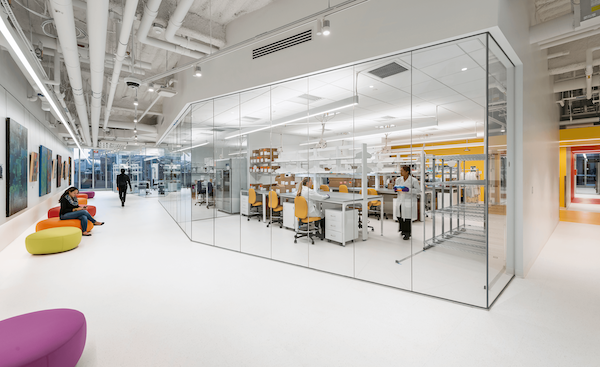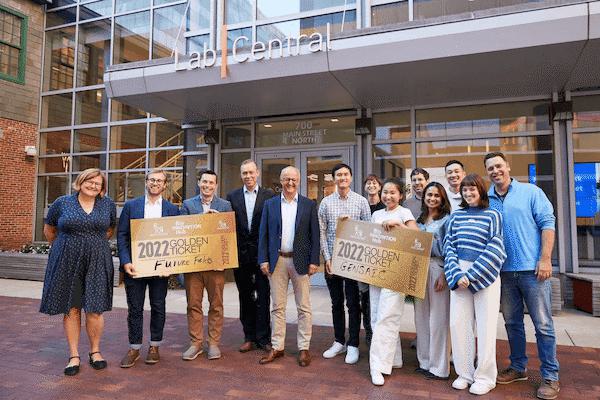Disclaimer: The views, thoughts, and opinions expressed in this blog belong solely to the individual author, and not to LabCentral or the author's employer, organization, or committee.
Building equitable, accessible and inclusive internships is just one important way we can empower promising talent facing systematic obstacles towards building careers in the biotech industry. In a recent report published by The Boston Foundation, low-income 4-year college graduates from New England universities earn on average 20% less than the average starting salary for their peers.
There are many reasons for this discrepancy, but college internships are shown to have a direct correlation to bachelors-level employment following graduation. While under-representation and poverty are not synonyms, no-one would disagree that they are inextricably tied. Approaching diversification of our talent pool by creating opportunity for those coming from non-privileged backgrounds will force the needle in the right direction.
According to a 2019 Student Survey from the National Association of Colleges and Employers (NACE), more than half (53.2%) of all graduating seniors who applied for a full-time job received at least one job offer. Within this group that received a job offer, 57.6% of students had previously held an internship while 43.7% did not. This significant gap led us to ask, how can industry hiring organizations attract and develop promising talent from non-privileged backgrounds through internships?
With the help of our recent Fire Circle, a convening of local non-profits, university internship programs, startups, human resources, and biopharma professionals, we explored best practices for building internship programs that work for students from under-represented, low-income, and first-generation college backgrounds. As we stepped back and thought about the discussion, one lesson stood out related to how companies typically find students for their internship programs.
"A close friend of my brother's daughter is studying biology at Haute Monde University, and is looking for a summer internship. I've attached her resume. Do you have any relevant opportunities in your lab for her...?"
Everyone in a leadership position in biotech has received those emails – it is almost the de facto internship process for much of the corporate and biotech world. But close-knit recommendations and personal family referrals are inherently inequitable and will continue to reinforce the lack of diversity in our industry by limiting opportunities and access to those already in our own personal and professional circles.
"OK, I get it. I'll post an internship job description so anyone can apply. This will provide equitable opportunity."
Not so fast! Posting an internship job description via standard college job boards, reviewing applicants and selecting the candidate that looks most prepared, will inherently fail from an equitability perspective. Remember, that equity and equality are not the same thing.
Students that come from privileged backgrounds and/or elite institutions of higher education will always land positions when put in competition against students that had to work full time at a restaurant through high school to help pay the family bills. They likely haven’t had access to as many opportunities like summer science camps; high school internships by way of a well-placed family member, neighbor or friend; or extra-curricular opportunities and travel programs that build the type of experience that our resume reviewing-selves salivate over. To review interns with equity in mind, we must compare apples to apples, and oranges to oranges.
"Hold on, does that mean I should 'settle' and be willing to 'hire less than the best?''
NO! On the contrary, recognizing the need for equity in hiring interns is about acknowledging and recognizing that apple turnovers cannot be made with oranges, but orange sherbet is a really great thing too, and who doesn't want more dessert?
There are many approaches to building equitability in your recruitment process for interns, but the first requirement: Commit, Commit, Commit. Set yourself a corporate objective or HR milestone to recruit a certain number of interns that represent under-represented categories, students from non-elite institutions of higher education, students from low-income backgrounds, and/or students that are first-generation college students. Stick to recruiting for these slots. Post your job description at under-estimated educational institutions such as community colleges and non-elite undergraduate institutions, not just the alma-maters of your team. Reach out to professors of relevance, student unions and career offices.
If this feels like a lot of work, it is. But it is necessary. If you desire a more straight-forward process, hire out of an internship program (see below) that provides a curated set of students and support services. If you commit a slot or two in your intern lineup to one of these programs, you will ensure your team is supporting the development of under-represented candidates and under-estimated talent in the industry.
Once you have made the commitment, the next key to hiring interns that come from under-privileged backgrounds is to change the way you review resumes and perform your interviews. Focus on qualities, values and transferable skills, not just previous internship experience or technical skills. For example, an experienced barista at a high-volume coffee shop likely has focused attention to detail and can produce consistent results in a fast paced environment. Is this relevant at your company? In that apples to apples analogy, seek candidates from under-represented and under-served categories that have the most highly transferrable skills, are fast learners and score high on the 'got grit scale.' They will add value to your team and grow dramatically over their internship given the right support.
If I have sold you on this approach, congrats, and welcome to the LabCentral Ignite community of organizations that is working proactively to change the dynamic for diversity and representation in our industry. We're glad to have you! Now that you are here, be aware, commitment and recruitment is a false summit that gives you a glimpse through the trees of a multi-hill climb to the top. Dig into our Tool Box on Equitable Internships and watch our mini-panel discussion on this topic to explore additional things you should have in mind like compensation, building inclusion, assessment of skills, and creating team buy-in.
Consider your internship program an investment in the future of our workforce. Even though this intern may never come back to you, it is good business to support our future generation – that generation will come back. What will the talent coming back be prepared for? It's up to you!












